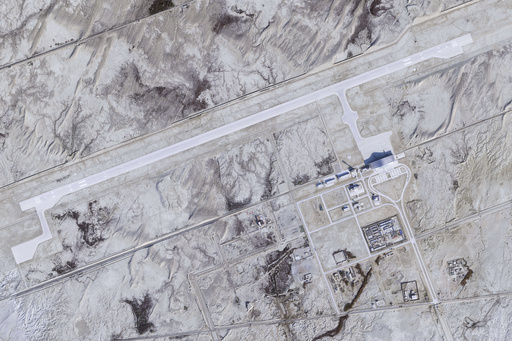
GWADAR, Pakistan — The New Gwadar International Airport, despite being Pakistan’s newest and priciest aviation facility, remains shrouded in mystery, operating without flights or passengers. This $240 million project is fully financed by China, leaving many to wonder when it will officially start operations.
Situated in the coastal region of Gwadar, the airport was completed in October 2024, standing in stark contrast to the challenges faced by the impoverished Balochistan province surrounding it. For over ten years, China has invested heavily in both Balochistan and Gwadar, as part of the ambitious China-Pakistan Economic Corridor (CPEC) initiative that links Xinjiang province in China to the Arabian Sea. Authorities have promoted this project as transformative, yet visible changes in Gwadar remain elusive. The city lacks a reliable connection to the national electricity grid—power is sourced from neighboring Iran or generated through solar panels—and there is an inadequate supply of clean drinking water.
With a planned capacity for 400,000 passengers annually, an airport does not rank high on the priorities of Gwadar’s 90,000 residents. Azeem Khalid, an expert in international relations focusing on the dynamics between Pakistan and China, suggests that the airport primarily serves Chinese interests, providing secure access for Chinese nationals to the region.
Balochistan’s tumultuous history with insurgency has intensified due to CPEC’s establishment. Separatist groups claim the state is exploiting local resources to the detriment of the indigenous populace, leading to clashes against both Pakistani forces and Chinese workers in the province. Meanwhile, members of the Baloch ethnic group report systemic discrimination by the government, which they assert denies them opportunities enjoyed by other citizens—a claim the government disputes.
In response to ongoing dissent, Pakistan has bolstered its military presence in Gwadar, leading to a fortified environment filled with checkpoints, barricades, and surveillance. Access to certain areas is frequently restricted to ensure the safety of visiting Chinese personnel and Pakistani officials.
Local residents express significant frustration over this environment. As 76-year-old Khuda Bakhsh Hashim reflects on a time when privacy was respected and life was simpler, he mourns the lost freedom. “Now we must prove our identity and justify our presence here,” he laments. Hashim reminisces about the days when Gwadar was a thriving port under Omani control, where basic needs were readily met, and employment was plentiful.
Today, however, water scarcity and unemployment haunt the area. Although the government claims that CPEC has generated approximately 2,000 jobs for locals, confusion persists about the definition of “local,” with many questioning whether it includes Baloch residents or individuals from other regions of Pakistan. Despite Gwadar’s charm and vibrant community, the city suffers from a lack of transportation options, relying on just one commercial flight route to Karachi, while other desired destinations, including Quetta and Islamabad, remain inaccessible by direct flights.
Misgivings run deep in the community, particularly among those who closely associate the government with the ongoing violence that has plagued Balochistan. Since the insurgency’s onset five decades ago, countless individuals have gone missing, leading to fears that anyone who opposes the status quo risks severe consequences. Many locals report that forced abductions and torture occur, allegations the government denies. Hashim, expressing a desire for CPEC to deliver real benefits to the youth, notes, “People won’t stray down the wrong path if they have food on the table.”
While militant activity waned following a 2014 government offensive, incidents have surged recently as militant factions, including the Baloch Liberation Army, feel empowered by shifting political dynamics. The planned inauguration of the airport has faced delays due to security apprehensions, particularly regarding potential threats from the nearby mountains. Consequently, virtual ceremonies replaced public celebrations, and no local residents were involved in airport operations—including jobs related to security management.
In December, public protests gripped Gwadar as residents demanded better living conditions, including access to electricity and water. Although authorities agreed to these demands, little progress has been made since. Experts, including Khalid, argue that as long as local people are excluded from the benefits and services of CPEC, its purpose will remain unfulfilled. He emphasizes the mutual distrust between the Pakistani government and the Baloch people, suggesting significant barriers need to be transcended for improvement to take root in Gwadar and beyond.

